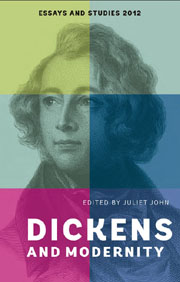Book contents
- Frontmatter
- Contents
- LIST OF ILLUSTRATIONS
- ACKNOWLEDGEMENTS
- NOTES ON THE CONTRIBUTORS
- INTRODUCTION
- 1 THE DICKENS TAPE: AFFECT AND SOUND REPRODUCTION IN THE CHIMES
- 2 DICKENS, SEXUALITY AND THE BODY; OR, CLOCK LOVING: MASTER HUMPHREY'S QUEER OBJECTS OF DESIRE
- 3 TEXTS, PARATEXTS AND ‘E-TEXTS’: THE POETICS OF COMMUNICATION IN DICKENS'S JOURNALISM
- 4 CORPUS STYLISTICS – DICKENS, TEXT-DRIVENNESS AND THE FICTIONAL WORLD
- 5 THINGS, WORDS AND THE MEANINGS OF ART
- 6 DICKENS AND THE CIRCUS OF MODERNITY
- 7 THE OLIVER! PHENOMENON; OR, ‘PLEASE, SIR, WE WANT MORE AND MORE!’
- 8 ‘WOW! SHE'S A LESBIAN. GOT TO BE!’: RE-READING/RE-VIEWING DICKENS AND NEO-VICTORIANISM ON THE BBC
- 9 OUT OF PLACE: DAVID COPPERFIELD'S IRRESOLVABLE GEOGRAPHIES
- 10 AFTERWORD: THE 2012 BICENTENARY
- Index
9 - OUT OF PLACE: DAVID COPPERFIELD'S IRRESOLVABLE GEOGRAPHIES
Published online by Cambridge University Press: 05 February 2013
- Frontmatter
- Contents
- LIST OF ILLUSTRATIONS
- ACKNOWLEDGEMENTS
- NOTES ON THE CONTRIBUTORS
- INTRODUCTION
- 1 THE DICKENS TAPE: AFFECT AND SOUND REPRODUCTION IN THE CHIMES
- 2 DICKENS, SEXUALITY AND THE BODY; OR, CLOCK LOVING: MASTER HUMPHREY'S QUEER OBJECTS OF DESIRE
- 3 TEXTS, PARATEXTS AND ‘E-TEXTS’: THE POETICS OF COMMUNICATION IN DICKENS'S JOURNALISM
- 4 CORPUS STYLISTICS – DICKENS, TEXT-DRIVENNESS AND THE FICTIONAL WORLD
- 5 THINGS, WORDS AND THE MEANINGS OF ART
- 6 DICKENS AND THE CIRCUS OF MODERNITY
- 7 THE OLIVER! PHENOMENON; OR, ‘PLEASE, SIR, WE WANT MORE AND MORE!’
- 8 ‘WOW! SHE'S A LESBIAN. GOT TO BE!’: RE-READING/RE-VIEWING DICKENS AND NEO-VICTORIANISM ON THE BBC
- 9 OUT OF PLACE: DAVID COPPERFIELD'S IRRESOLVABLE GEOGRAPHIES
- 10 AFTERWORD: THE 2012 BICENTENARY
- Index
Summary
Centredness, presence, being – these elusive categories are always at risk in Dickens. They may be threatened by self-doubt; insanity; the burden of the past (expressed as guilt or debt); foreignness and savagery; vanity and deceit; even metaphysics. A proverbial celebrant of domesticity and tradition who nevertheless needed to be perpetually in motion, both mentally and physically, Dickens was acutely aware of the difference it may make to live on one spot on the earth's surface rather than another, and the problems involved in conforming our ideas of self and duty to geographical space. Do we try to extend our sympathies, like Mrs Jellyby, to far-off places? Can we afford to do so? Is the world on our own doorstop not already exotic and shockingly alien?
We are isolated not just in space, but also in time. Dickens consistently represents the present as an island between a dreadful past and an unknowable future. The oft-mentioned titles of the false books at Gad's Hill – ‘The Wisdom of Our Ancestors – I. Ignorance. II. Superstition. III. The Block. IV. The Stake.…’ (House 35) – are fairly symptomatic of his view of a world of horrors which we are so lucky as to have left (he thought), very recently, behind.
- Type
- Chapter
- Information
- Dickens and Modernity , pp. 193 - 208Publisher: Boydell & BrewerPrint publication year: 2012



